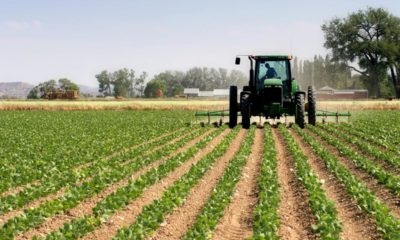The Federal Government has commenced the harvesting of wheat from its first dry season wheat farm in Papa community, Nafada Local Government Area, Gombe State.
It said about 1,000 metric tonnes of wheat would be harvested from the 200 hectares farm in the state to shore up the country’s wheat production and help ameliorate the impact in the reduction of wheat imports caused by the Russia-Ukraine war.
Nigeria and many other nations import a large percentage of wheat from Ukraine and the war in the foreign country has drastically reduced the supply from that part of the world.
But the Federal Government through its National Agricultural Land Development Authority announced on Friday that it had started harvesting the commodity from its dry season wheat farm in Gombe, adding that an additional 1,000MT was expected from other states.
The Executive Secretary, NALDA, Paul Ikonne, who disclosed this in a statement issued in Abuja, said the farmland was cultivated in December last year by 100 women and youths from the community.
He stated that the beneficiaries were provided with two tractors, agrochemicals, fertilisers, irrigation pump, improved hand tools, land clearing and technical guidance by NALDA.
The statement stated that youths and women were seen harvesting, threshing and bagging the produce when the NALDA team visited the farm.
“This gathering is the celebration of the outcome of the partnership between NALDA and Gombe State Government late last year,” Ikonne stated.
He added, “The authority observed that wheat, an agricultural product, is the third item in the national importation list, and resolved to rewrite history on this. This made NALDA to collaborate with some states including Gombe to produce wheat.”
The Commissioner of Agriculture and Animal Husbandry, Gombe State, Magaji Gettado, said the farm would go a long way to improve the livelihoods of farmers in the state.
He stated that before the establishment of the farm, youths of the community at this particular period of the year often migrated to neighbouring Taraba State and other towns to earn a living, but noted that they were currently on the ground in Gombe working on the dry season wheat farm.

 Forex3 weeks ago
Forex3 weeks ago


 Naira2 weeks ago
Naira2 weeks ago
 Billionaire Watch2 weeks ago
Billionaire Watch2 weeks ago




 Naira2 weeks ago
Naira2 weeks ago




 Naira2 weeks ago
Naira2 weeks ago




 Naira1 week ago
Naira1 week ago




 Naira4 weeks ago
Naira4 weeks ago




 Naira3 weeks ago
Naira3 weeks ago


















